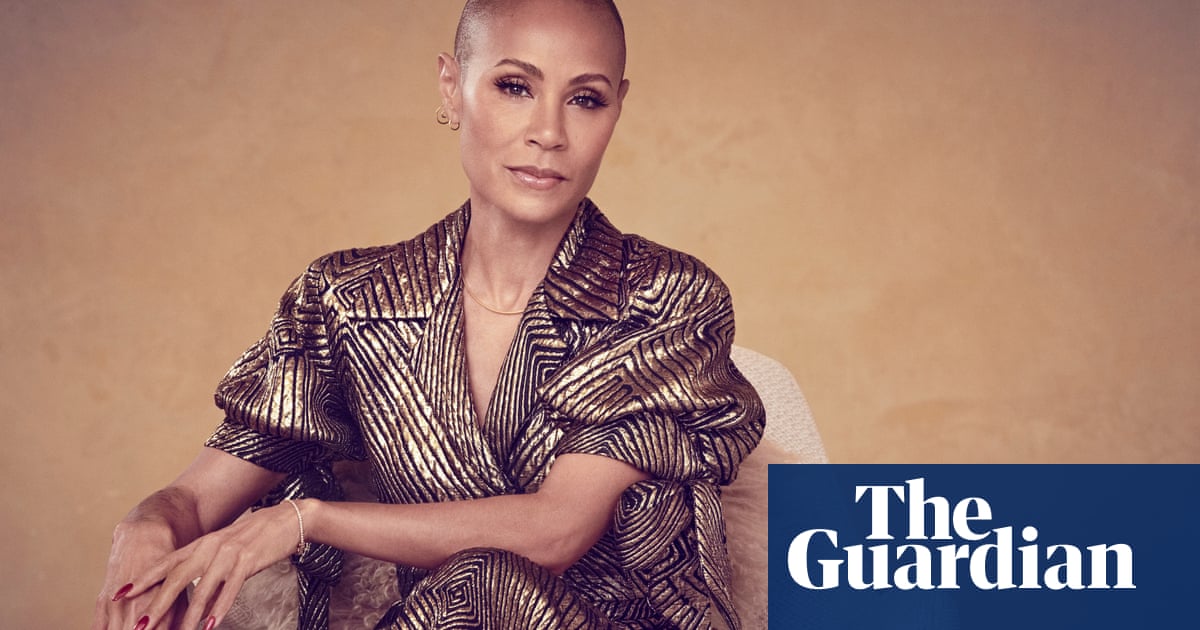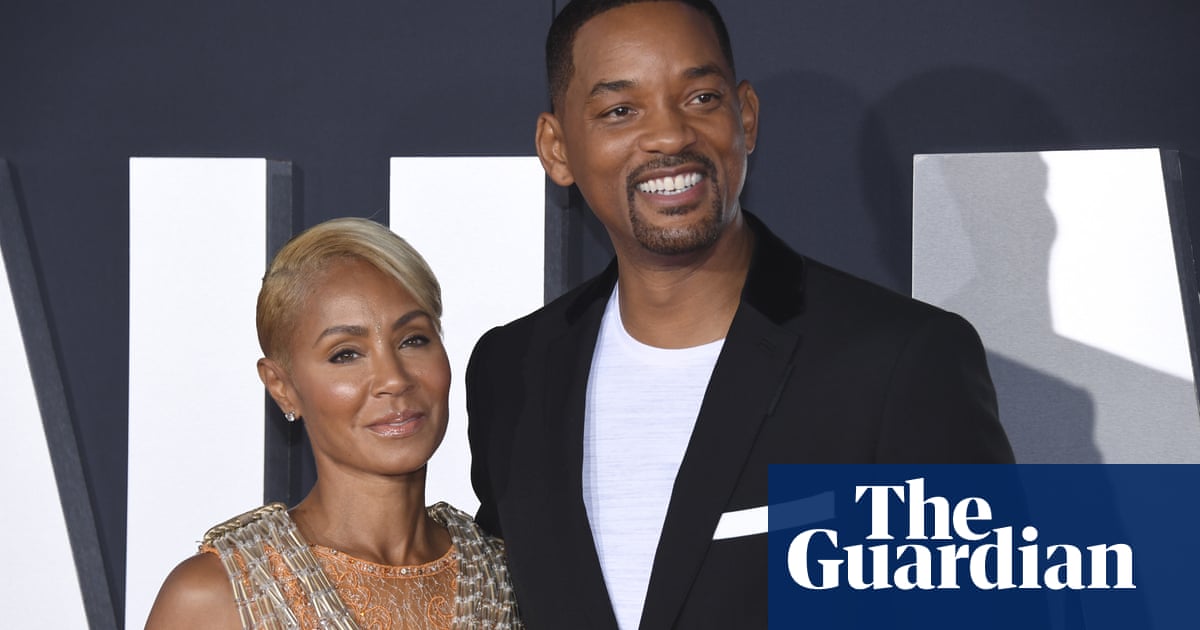
Jada Pinkett Smith plays many roles in a day. She’s an actor, a mum, a wife. Once the frontwoman of a metal band called Wicked Wisdom, she is also a soon-to-be memoirist – as well as, to some, an almost pathological over-sharer on Red Table Talk, the Facebook Watch chatshow she co-hosts with her daughter Willow and her mother Adrienne “Gammy” Banfield-Norris.
But Pinkett Smith isn’t entirely comfortable with the reputation she has acquired: a honey-voiced, wise woman who never seems ruffled or fazed – a “level five auntie” as someone on social media put it. “Well, it’s interesting,” she says, speaking from her Los Angeles office. “I don’t really look at it that way. But I do think that, as we get older, that’s how it should be.” She laughs and soon I’m on the receiving end of one of her classic soothing declarations. It feels like a cross between a sermon and a guided meditation.
By the time you’re her age – she’s 51 – you have found your zen state. “You’ve been through enough trials and challenges.” The energy of your youth has mellowed, she adds, in a nod to 22-year-old Willow. “I see my younger self in her. She’s so fiery, so ready to go. Ready to take on the world.” She laughs again. “Then, as you get older, you don’t hold on to that stage. You pass the torch and settle into your new understanding.” That is how you become a level five auntie.
Pinkett Smith sounds this reflective while promoting her new Netflix docuseries African Queens, which she narrates and executive-produced. Each season will focus on a different royal, looking to plug the major knowledge gaps in African history for people who grow up outside the continent. Pinkett Smith is in her element, using the life-and-death peril of the show’s protagonist, Queen Njinga of what became Angola, to muse on the human experience. I start to feel as though I’m listening to a podcast hosted by a therapist.
Although Pinkett Smith is radically open on Red Table Talk, she is firmly in promotion mode today. A publicist interrupts when our chat veers away from the show, while The Slap is most definitely off the table. In case you somehow missed it, that was the shocking moment at last year’s Oscars when Pinkett Smith’s husband Will Smith struck Chris Rock after the ceremony’s host made a joke at her expense.
I get the sense she only speaks publicly about private issues on her terms. Sure, she’ll broadcast intimate details of her marriage to millions on Facebook, such as hating her own wedding day, not to mention her near-addiction to masturbating several times daily. But today, she sidesteps anything that could cause a stir.
To understand the person behind the headlines, you have to go back. Then her stoicism, in the face of constant tabloid frenzies, begins to make sense. She started out as a young dancer and actor, breaking out with a recurring role on Cosby Show spin-off A Different World in the early 1990s. Then, aged 21, she met Will, though they didn’t date for a few years. She turned to film, crossing over from Black classics such as Set It Off and The Nutty Professor to her early 2000s stint as Niobe in The Matrix sequels.
Navigating the industry as a Black woman came with its own challenges. “I was in a world where there hadn’t been a lot of learning about, or a lot of desire to understand, the Black experience. That’s a new thing. Now it’s politically correct: everybody’s got to understand each other or else it’s cancel culture.” Back then, when she was being told to wear her curly hair straight, or being typecast as the hip Black friend in films such as 2008 romcom The Women, she felt hemmed in.
Typically, she rose above it. But wasn’t it frustrating? Rather than answer directly, she invokes her maternal grandmother, who helped raise her. “In most Black families,” she says, “the women are the glue. They’re the matriarchs, the weavers of love, the leaders of spiritual knowledge within our homes.” Her mum Gammy gave birth to Pinkett Smith while a teen, moving in and out of her own mother’s house while trying to get her head around motherhood and dealing with a decades-long drug addiction. She’s well now.
Pinkett Smith’s grandma taught her that “there was nothing to gain from retaliation. There was nothing to gain from becoming the thing that was causing us pain.” Essentially, she was brought up to dust herself off. “Martin Luther King Jr’s whole idea was: ‘Look, the only way to combat misunderstandings is through love.’ Call that misunderstanding whatever you want: racism, prejudice, whatever. Sometimes, it’s not even prejudice but just ignorance.”
A beat. “Sometimes it is racism too,” she adds. “But the only way you can cure it is by putting love on it. And I had to learn that.” I can’t imagine the civil rights leader would have defined Jim Crow laws and their de facto state-sanctioned violence as only a misunderstanding, but her point stands: she faces negativity with compassion.
How much did her upbringing feel different from that of her white peers, then? “Oh, very different,” she says, her voice lowering to a purr. “And learning how to respect those differences, even if my difference wasn’t respected – that really is my grandmother’s teaching, right? She wanted me to be able to walk in any world, with anyone, and relate – no matter if they understood me or not.” She won’t add any more, and swiftly returns to a soundbite about Queen Njinga fighting off the Portuguese colonial mission.
I play ball, relating my questions to the show’s content. Njinga negotiated with the greedy Europeans, I say, then ask how Pinkett Smith handled tough situations in her own career. What did it mean to put her grandma’s wise words into practice, being dragged through gossip columns as she has been? “I think every woman has to find her own solutions,” she says. Care to share one?
She pauses, then goes on. “Even something as simple as coming into the game at such a young age, and how I had to navigate the necessity to be ‘less Black’. How do you navigate people being threatened by your Blackness? Having to really not take it personally and understanding: ‘OK, this is the land I’m in right now. How do I navigate this without allowing their discomfort with my Blackness to get on me?’ That’s a hell of a thing to navigate.”
Just about every actor in her peer group would have a similar story, she says. “It’s something that can either make you bitter” – she smacks her lips – “or it’s something you can look at, not take personally, then push against.” Women did it in their own ways, she begins, listing off names from Halle Berry and Nia Long to Gabrielle Union and Set It Off co-star Queen Latifah.
“We all had to figure out … ” She falters then starts again. “There are always those compromises you make that you hope don’t totally pull you away from your roots. That’s the difference between being confused, or being swallowed by becoming someone else to get what you need. It’s about being clear who you are.”
For her, that has meant approaching marriage and motherhood in unconventional ways. When Willow and her brother Jaden were teens, they were painted in the press as weird, sheltered rich kids with little grasp of reality , the result of a joint 2014 New York Times interview and Jaden’s stream-of-consciousness tweets.
Pinkett Smith and Will dedicated two Red Table Talk episodes to their marriage in the show’s first season, spanning Will falling in love with Pinkett Smith while still married and the breaking point that made them separate after her 40th birthday. She was then mocked in 2020 for calling a romantic relationship she had with musician August Alsina an “entanglement” rather than an affair. And then, with the slap, her husband flung their marriage back under the spotlight.
While commentators frothed at the mouth, the slap made Pinkett Smith’s alopecia diagnosis and hair loss a watercooler topic (she had first mentioned them on Red Table Talk in 2018 and later on Instagram). What did she learn from having her autoimmune illness folded into a global scandal? The publicist cuts in, but Pinkett Smith takes a long breath and speaks anyway. “I learned a lot about detachment. And I learned a deeper beauty within myself, being able to let my hair go.” Her voice is so quiet that I strain to hear her.
Her diagnosis has been “a great teacher. It’s been a hard one, a scary one – because specifically as Black women, we identify so much of ourselves with our hair. And it was scary. I had to really dig deep and see the beauty of myself beyond my aesthetics.” It’s the most direct she’s sounded. And that’s as far as she’ll go – but she can’t resist leaving me with some gentle, sage advice.
“How old are you?” she says. When I respond, she labels me “still very young. So when you think about how people get a little older, and say what they need to say without a filter – they’ve earned that. When you get to my age, you get so settled in your skin, so comfortable in the knowingness of you, that you don’t get concerned about what other people have to say. The elders earn that.”












